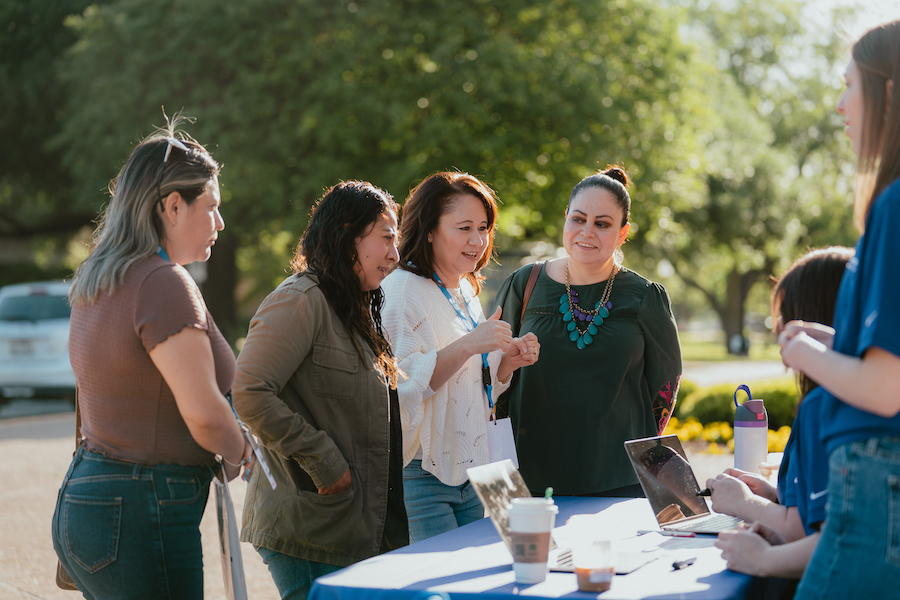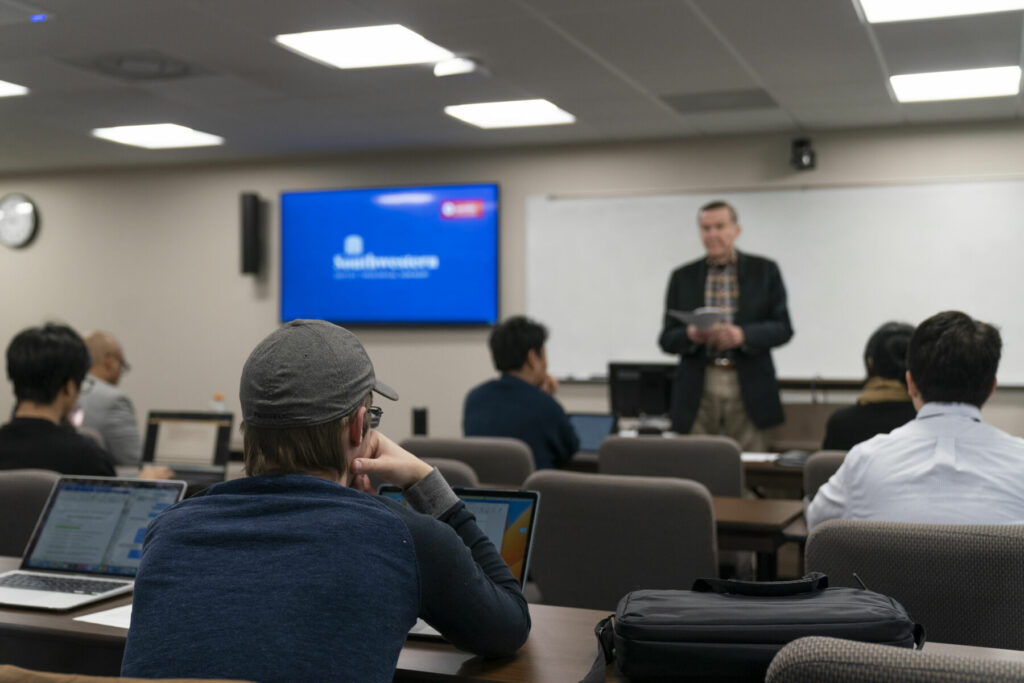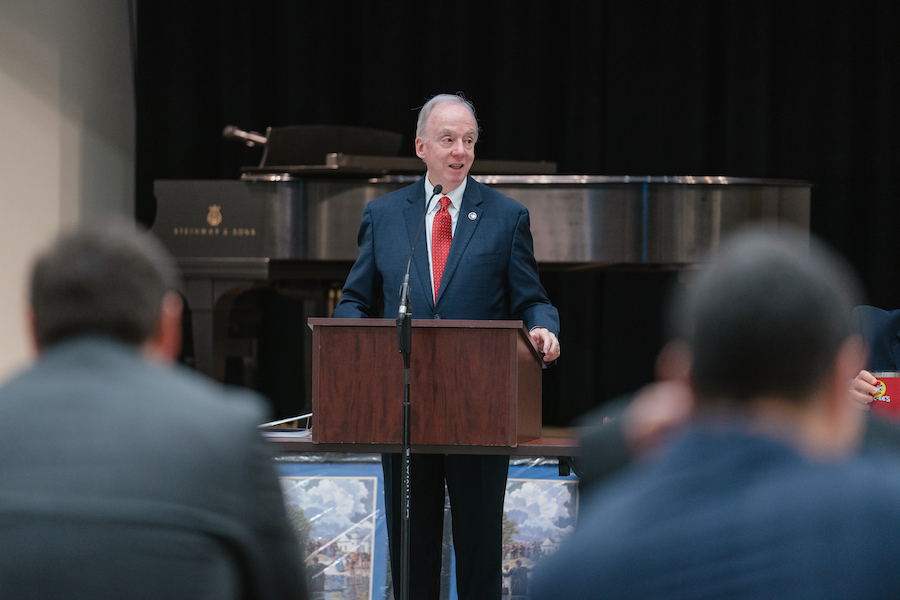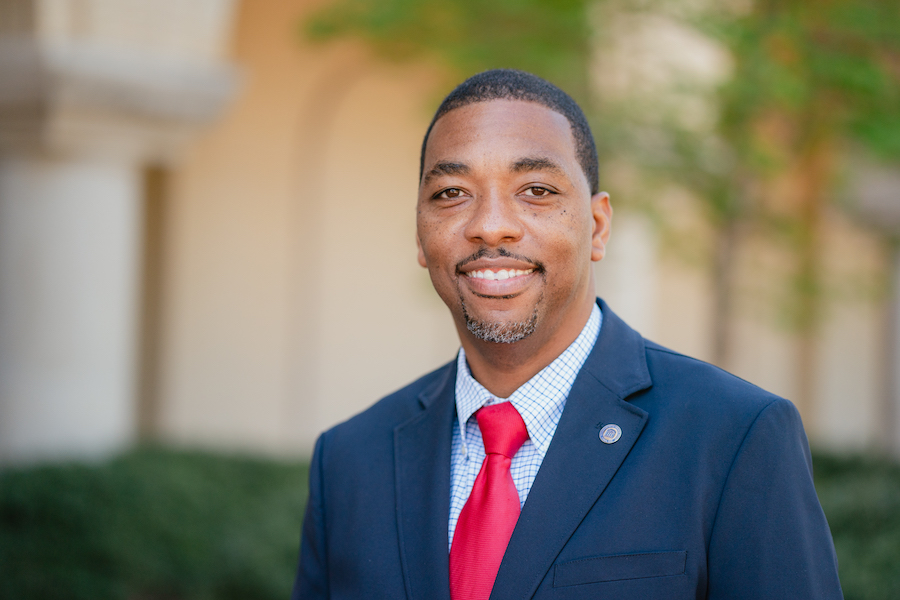A Great Commission Legacy: The Roy J. Fish School of Evangelism and Missions continues a living tradition at Southwestern Seminary
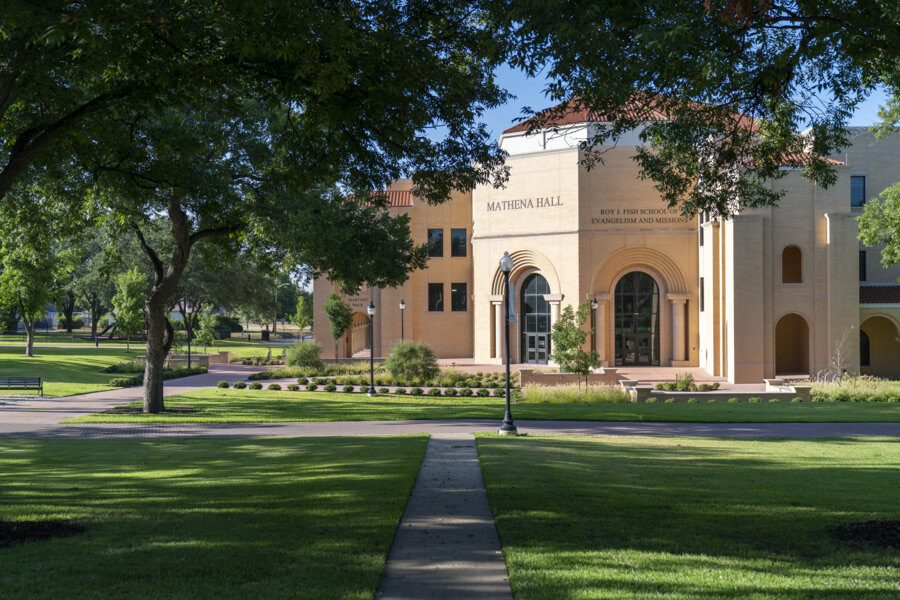

Editor’s note: The following feature story originally appeared in the summer 2021 issue of Southwestern News.
JENNY KIM (’18, ’19), a two-time graduate and current Ph.D. student from Seoul, Korea, once believed door-to-door evangelism was unusual and awkward. Prior to her 2015 Contemporary Evangelism class in Southwestern Baptist Theological Seminary’s Roy J. Fish School of Evangelism and Missions, Kim was mostly unfamiliar with the evangelistic model and prepared for what she thought would be a challenging semester.
However, as Kim observed other students and professors participate in door-to-door evangelism and initiate conversations with strangers, she quickly saw its value. She learned that people were generally more willing to listen than she ever anticipated. Through this class with Matt Queen, L.R. Scarborough Chair of Evangelism (“Chair of Fire”), as well as relationships with faculty and students, the Fish School has been instrumental in her personal evangelism and ministry.
“In the Fish School we are trained biblically, academically, and spiritually to understand the importance of theology and the practice of evangelism,” Kim says. “When there are still so many people who have not heard the Gospel, the Fish School does not only train its students to share the Gospel, but equips each student to be able to equip the church to share the Gospel to the lost.”
The commitment to the Great Commission is one of Southwestern Seminary’s greatest founding principles, says John D. Massey, dean of the Fish School. In 2005, the seminary strengthened this vision when the division of evangelism and missions was reorganized as the Roy J. Fish School of Evangelism and Missions. Then when Massey assumed his role in 2019, the transition allowed for a renewed focus on Southwestern Seminary’s legacy.
The school’s namesake, Roy J. Fish, served as professor of evangelism at Southwestern Seminary for nearly 50 years and was honored as a distinguished alumnus at the 2021 Alumni and Friends Luncheon at the Southern Baptist Convention. He earned a Bachelor of Divinity in 1957 and a Doctor of Theology degree in 1963. He was known as a fervent soul-winner and inspired decades of students with his evangelistic zeal.
Massey says he does not aim to bring a new vision, but reinvigorate the seminary’s original vision to advance and fulfill the Great Commission. Today, students not only have access to opportunities to begin their ministries in Fort Worth, but they also have access to a faculty with a wealth of knowledge and decades of field experience.
EVERYDAY EVANGELISM
Evangelistic zeal is just one facet of the Fish School and Southwestern Seminary’s Great Commission legacy. Today these efforts are led by Assistant Professor of Evangelism Carl Bradford, and Matt Queen.
“[Matt Queen] is a living embodiment of the Southwestern tradition of getting students engaged in evangelism through the classroom, communicating the responsibility of all believers to share the Gospel with others,” Massey says. “That is something that is at the heart of what we do here. It is our responsibility to take the Gospel to the nations, beginning right there where we are.”
Queen explains that his evangelistic philosophy is rooted in the Bible, and he believes evangelism is necessary for obedience to Christ and the Great Commission. Although he teaches that evangelism is the responsibility of all believers, Queen says he does hold his students to a higher expectation of learning and memorizing the Bible.
“My hope is that their eyes would be open to the fact that this world is a lot more lost than the seminary or church bubble convinces us that they are,” Queen says. “The only way that they have a chance to escape the judgment of God is if we, in the power of the Spirit, are going and telling people. Then hopefully that they have a habitual practice of praying for the lost and sharing the Gospel with the lost.”
The Fish School facilitates numerous opportunities for students to engage in evangelism throughout the year. One of its primary efforts is through the school’s Everyday Evangelism initiative.
This effort facilitates weekly evangelism opportunities for students to join teams that take the Gospel door-to-door in nearby neighborhoods, as well as in parks and university campuses among other locations. Although many students like Jenny Kim initially join through their evangelism courses, all students, faculty, and staff are invited to participate in an Everyday Evangelism team.
Even with some weekly evangelism opportunities postponed due to COVID-19 during the 2020-2021 academic year, students in the Fish School were still actively sharing the Gospel. During the fall and spring semester practicums, a total of 2,440 Gospel presentations were made, with 250 people making professions of faith as a result of those conversations.
The Fish School also sends students to participate in other efforts including Crossover, the evangelistic effort that takes place prior to the Southern Baptist Convention annual meeting.
“Southwestern Seminary has been strongly involved in [Crossover],” Queen says. “At least for the last several years, Southwestern Seminary has had the largest participation among our seminary partners in terms of student participation.”
During the 2021 Crossover event in Nashville, June 7-11, 20 Southwestern Seminary students participated. Student teams engaged in 188 Gospel conversations, from which six people made professions of faith.
CROSS-CULTURAL MISSIONS
Another key facet of the Fish School is its effort to train and equip God-called men and women to reach the nations. Throughout the seminary’s history, Massey says the seminary has prepared more students for work with the International Mission Board (IMB) than any other Southern Baptist seminary.
“Southwestern has historically put on the field more than 50 percent of the missionaries that have served since the inception of the seminary,” Massey says.
Southwestern Seminary graduates have gone on to serve all over the world, many as longtime workers with the International Mission Board.
Evan* (’20) from Arkansas, is a recent alumnus who returned to the seminary to finish his Master of Theological Studies degree after more than 20 years of field experience serving with the IMB, most recently as the East Asian affinity group leader.
In that time, Evan has served in Southeast Asia in numerous leadership roles where he provided oversight to teams that have reached more than 100 unengaged and unreached people groups. They have also developed programs to provide reading and writing resources to at least 6,000 Southeast Asians. These efforts, Evan explains, have ultimately led to hundreds of professions of faith and several new church plants.
“If you are preparing for ministry and/or the mission field, then any prospective student will greatly benefit from the investment by the professors,” Evan says, noting the vast ministry experience of the faculty. “There is such a Great Commission focus so that anyone can play their part in finishing the task among all people, whether they stay close to home or serve in some far-off place.”
As Evan identified the gaps in his knowledge and education, he says professors such as Massey “have been especially helpful in structuring classes that would help me grow in my knowledge and understanding of key missiological topics.”
EXPERIENCED FACULTY
Essential to the training of men and women for local and global missions is the seminary’s faculty, all who bring to the classroom specialized practical and theological insight to advancing the Great Commission on the mission field and in ministry. Together, Massey says, the faculty has a combined field experience of more than 100 years.
“Students who come here are going to be taught by those who have been engaged in the practice of missions,” Massey says. “When the students come here, they are going to get the real deal. They are going to encounter someone who not only knows missiology, but has practiced it.”
In 2020, Rebekah Naylor, longtime IMB medical missionary to India, was appointed to the faculty as the first female distinguished professor of missions and permanent missionary-in-residence. She is also the daughter of the seminary’s fifth president, Robert E. Naylor.
Prior to joining the faculty, she spent nearly 40 years in India working as a general surgeon, evangelist, and church planter.
Naylor was first appointed to the Foreign Mission Board (now the IMB) in 1973 and went on to serve at the Bangalore Baptist Hospital from 1974-2002 where she eventually assumed the positions of chief of medical staff, administrator, and medical superintendent. In 1996, she became the namesake for the newly constructed Rebekah Ann Naylor School of Nursing in Bangalore.
Naylor’s mission work included service as a strategy coordinator for the IMB, working with medical missionaries and local pastors to assist in the planting of 900 churches.
“Her presence on campus is not just symbolic, but it is one that is providing an example to students across campus of what it means to be a missionary, of what it means to be a woman serving in a cross-cultural setting,” Massey says.
As the missionary-in-residence at the Fish School, Naylor is available to talk with students about their callings and answer questions based on her years of experience.
“I seek to teach students that their professional identity and their identity as a Christ-follower should be totally integrated,” Naylor says. “It is as we go, as we work that we also introduce others to Jesus, tell our faith stories, and lead them to new life in Him.”
Andrew* from Kansas took a spring 2018 course with Naylor for his Certificate in Professional Missions. Now serving as a medical missionary in West Africa, he says Naylor played an important role in his studies as he pursued the Lord’s calling to medical missions.
“I learned from Dr. Naylor that caring for people’s spiritual needs and physical needs are not at odds with each other, but can actually be an integrated part of our work and ministry,” Andrew says. “Missionaries can use healthcare or other human needs ministries as a platform for witnessing and sharing the Gospel among unreached people groups.”
Another veteran of the mission field is Dean Sieberhagen, associate professor of Islamic studies and director of the Islamic Studies program. His experience includes decades of ministry to Muslims both internationally and locally in the United States. He teaches missions courses, including the introductory course taken by students from all schools, as well as courses in the topics of anthropology, church planting, and business as missions.
Sieberhagen aims to help students open their eyes to the significant global spiritual need, because “we get so caught up in the immediacy of the issues in America and the need for God to move in America, which is valid, but there are so many people groups in the world that are still so desperate for the Gospel,” Sieberhagen says.
“I hope through the courses they take that they will see the need for the world, and they will pray through how to respond to that,” Sieberhagen says, explaining that there are only two options for the Christian in their response to the Great Commission. “You’re either going to help reach the world or you’re helping to send those who go. That’s it.”
‘THE SUN NEVER SETS ON SOUTHWESTERN’
Fish School graduates are sent all over the world to serve the Kingdom of God and fulfill the Great Commission. Many students leave their American homes to serve internationally, but the student body is also comprised of a diverse international population.
Massey says the student population represents more than 40 nations. Many choose to move to Fort Worth for on-campus education, while others take advantage of online and flex-access programs so they can remain in their countries and ministries while pursuing theological education.
One such alumnus is Barbaro Abel Marrero (’20), president of the Havana Baptist Theological Seminary since 2014. Marrero explains the seminary he leads has endured significant financial and societal challenges in its history, but that God has been faithful to provide for the school and its 600 students.
Marrero says he first learned about the Ph.D. in World Christian Studies program from Daniel Sanchez, distinguished professor emeritus of missions. Marrero needed to remain in Cuba for his work and ministry, so the flex-access programs at the seminary enabled him to continue in that work.
“I would like to thank Southwestern Seminary for her commitment to serve the Global South (or Majority World), not only sending missionaries, but also training nationals at the highest level,” Marrero says. “In my opinion, that is a great investment and an outstanding way to serve those nations.”
Southwestern Seminary’s presence in Latin America can largely be credited to Sanchez, Massey says. Having served the seminary for more than 40 years, Sanchez has facilitated relationships between theological institutions, churches, and ministers in those countries.
“I seek to equip my students to relate properly to other cultures, to communicate the Gospel effectively in other cultures, and to plant and develop churches that make an impact in their culture,” says Sanchez.
MINISTRY BEGINS NOW
For the student in the Fish School at Southwestern Seminary, ministry truly begins now. The offered classroom experience combined with practical application opportunities is an essential foundation to their ministry preparedness.
Students do not have to wait until graduation to fulfill the Great Commission. The World Missions Center at the Fish School exists to facilitate opportunities for mission trips, evangelism training, and will help students connect with IMB personnel or any necessary next steps in their ministry. Whether pursuing cross-cultural missions, church planting, or evangelism, Massey says there is a degree program suited to preparing students for their ministries.
Wherever God ultimately calls each student, Massey says the Fish School aims to equip its students to be effective “change agents” starting within their own churches, helping others know how to do cross cultural-missions and evangelism starting in their own neighborhood.
“Missions is no longer just getting on a plane and going overseas,” Massey says. “It is waking up to the reality that God has brought the nations to us, and God has put that calling on us to make disciples of all nations.”
“We are going to go overseas, but now God has brought overseas to where we are now,” Massey says. “So, the Fish School wants to be at the forefront of training to reach people who are in their own diaspora, and God has called us to reach them with the Gospel.”
Katie Coleman is a news writer for Southwestern News.
